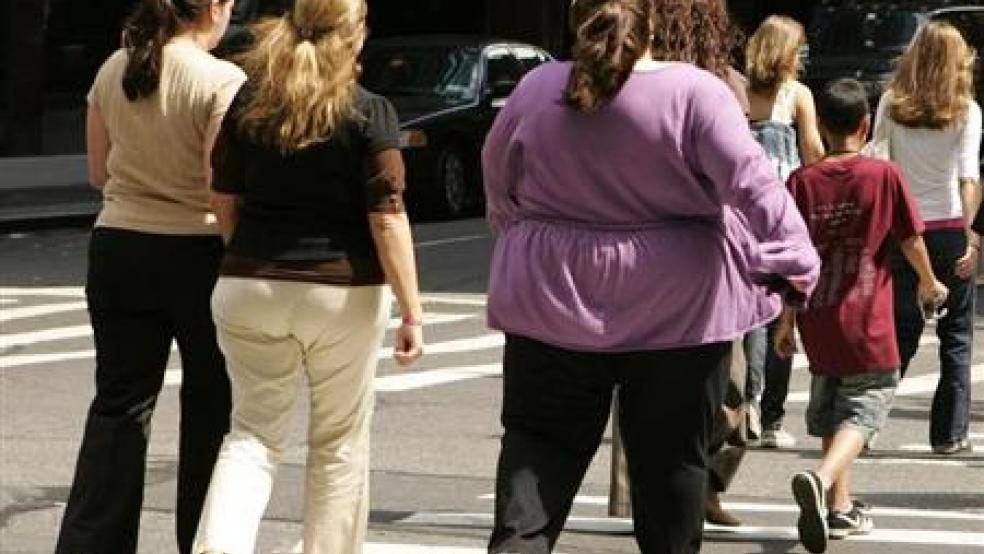Bayou La Batre calls itself the seafood capital of Alabama. Residents here depend on fishing and shrimping for their livelihood, and when they sit down to eat, they like most things fried.
It’s here that former U.S. Surgeon General Dr. Regina Benjamin has been trying to reverse the nation’s obesity epidemic one patient at a time. Benjamin grew up near Bayou La Batre and has run a health clinic in this town of seafood workers and ship builders since 1990. As obesity became commonplace around the U.S., health care providers like Benjamin began seeing the impacts of obesity all around them.
Related: Government's New Dietary Guidelines Could Set Off Food Fight
“We saw our patient population get heavier,” Benjamin said. “We saw chronic diseases start to rise, and if we continued, our entire community would totally be crippled, basically, based on chronic diseases.”
Two major trends are on a collision course here, as in the rest of the United States: a decades-long surge in obesity and the aging of the U.S. population. Today, one out of every three adults in the U.S. are clinically obese, and many who have lived for decades with excess weight, diabetes and heart disease are now heading into their senior years.
Obese people are far more likely to become sick or disabled as they age, and researchers say this burgeoning demographic will strain hospitals and nursing homes.
“We’re potentially going to have a larger, older population that’s more likely to be obese, surviving longer with cardiovascular disease and other chronic diseases,” said Dr. Virginia Chang, a demographer at New York University. “I think that the primary fallout from increasing obesity is probably not going to be some huge hit to mortality. It’s going to be disability.”
Related: Why the Alzheimer's Fight Has Only Just Begun
Those consequences may already be visible, researchers say. Lifelong obesity, now common across the country, is poised to undermine improvements in disability rates among older adults.
Steven Austad, chairman of the biology department at the University of Alabama at Birmingham, studies the effects of diet and nutrition on aging using mice. He says researchers used to think that aging was driven by different processes. “Your heart aged, your brain aged, your feet aged,” he said. “But now, we’ve realized, there’s a handful of processes that are involved in aging all parts of your body. And it turns out, one of those processes is inflammation.”
Inflammation naturally increases as we age, but that process is exacerbated by belly fat, which secretes chemicals that cause further inflammation around the body. “If you’re obese, then your system-wide levels of inflammation are higher, particularly when you get older,” said Austad.
That’s one reason scientists think men and women who are obese are more likely to develop dementia, Alzheimer’s disease and certain cancers as they age.
Related: How One Alzheimer's Family Sealed the Deal
Bob Parker, a Birmingham area resident, says his own weight is starting to catch up with him. As a realtor and Democratic party activist, he often attends meetings at restaurants and says all those nights dining out make it hard to eat well. Now, at age 60, he’s being treated for diabetes, high blood pressure, high cholesterol and sleep apnea. He’s lost 90 pounds—twice—and gained it back.
“It’s taken some energy away, for sure,” Parker said of his weight. “I like to do things out in the yard and I just can’t work on them as much. So, that’s pretty galling to be honest.”
Obesity is an expensive disease, especially for aging seniors. One study found that while obese 70-year-olds live as long as healthy weight 70-year-olds, they will spend $39,000 more on health care. “Obese people have higher healthcare costs than non-obese people. This is true virtually throughout life,” said David Allison, director of the Nutrition Obesity Research Center at the University of Alabama at Birmingham. As a person gets into the age when health care spending goes up, “that difference is going to be bigger and bigger and more and more important.”
Related: The Surprising Way One State Saved Over $68 Million
In part because of disability and poor health, surveys show more obese people are heading into nursing homes at younger ages and staying longer than non-obese residents. Two hours from Birmingham, in the northwest corner of the state, Generations of Red Bay is one of the only nursing homes in the region that is willing to take on the added expense of caring for heavier residents. Patients come from as far away as Texas.
Margaret Hilldouglas arrived here two years ago, at age 47, after she broke her knee. Surgery was considered too risky because of her congestive heart failure, so she languished in a hospital for weeks while a social worker looked for a nursing home that would accept her.
![]()
Patients like Hilldouglas require additional staff and costly equipment, including specialized beds, mechanical lifts, larger blood pressure cuffs and longer needles, said Aundrea Fuller, chief operating officer of Generations of Red Bay. “There are two certified nursing assistants for eight to ten residents. And that’s about twice the staffing that you would have for the general population of a skilled nursing facility.”
Most of the obese residents that move in here, even the younger ones, will need this type of care for the rest of their lives, Fuller said.
At the University of Alabama at Birmingham’s weight loss clinic, Bernard Rayford, 55, said he wants to avoid that fate. “I’ve always prayed, Lord, before I be a burden, just take me. I saw myself being a burden, and me being a major problem,” Rayford said after a vigorous workout in the clinic’s gym. “The end was for me not to make it. Or for me to end up being in an ambulance. And that’s, that’s the direction I don’t want to be in.”



